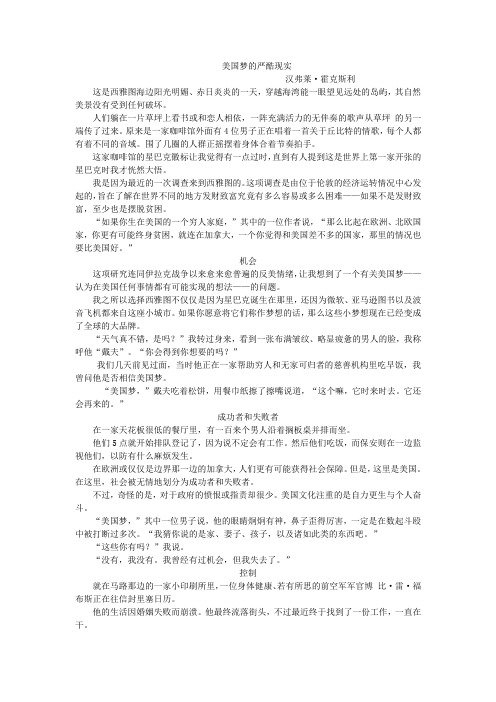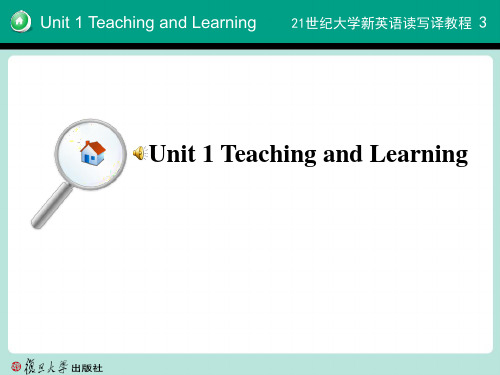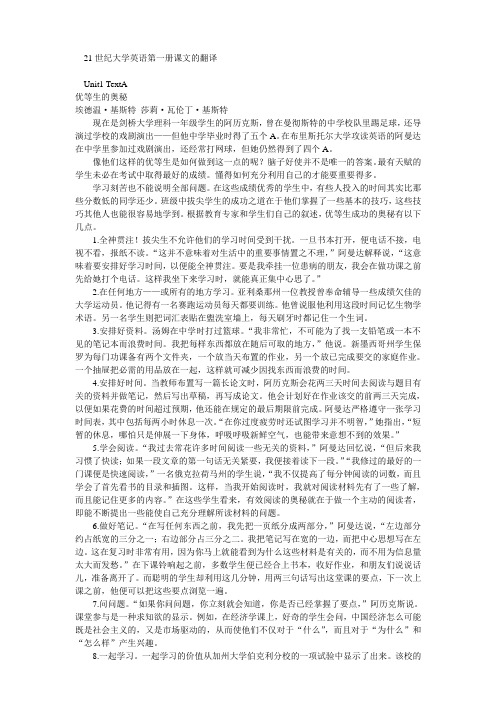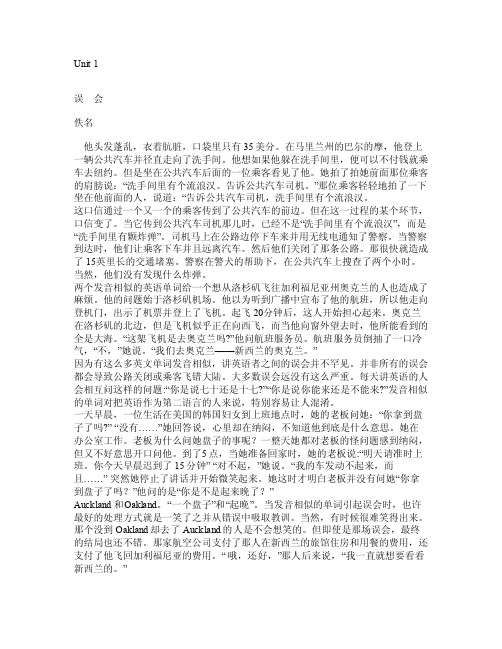最新21世纪大学英语课文翻译unit1资料
新21世纪大学英语综合教程4 Unit1译文 Harsh Reality of the American Dream 美国梦的严酷现实

美国梦的严酷现实汉弗莱·霍克斯利这是西雅图海边阳光明媚、赤日炎炎的一天,穿越海湾能一眼望见远处的岛屿,其自然美景没有受到任何破坏。
人们躺在一片草坪上看书或和恋人相依,一阵充满活力的无伴奏的歌声从草坪的另一端传了过来。
原来是一家咖啡馆外面有4位男子正在唱着一首关于丘比特的情歌,每个人都有着不同的音域。
围了几圈的人群正摇摆着身体合着节奏拍手。
这家咖啡馆的星巴克徽标让我觉得有一点过时,直到有人提到这是世界上第一家开张的星巴克时我才恍然大悟。
我是因为最近的一次调查来到西雅图的。
这项调查是由位于伦敦的经济运转情况中心发起的,旨在了解在世界不同的地方发财致富究竟有多么容易或多么困难——如果不是发财致富,至少也是摆脱贫困。
“如果你生在美国的一个穷人家庭,”其中的一位作者说,“那么比起在欧洲、北欧国家,你更有可能终身贫困,就连在加拿大,一个你觉得和美国差不多的国家,那里的情况也要比美国好。
”机会这项研究连同伊拉克战争以来愈来愈普遍的反美情绪,让我想到了一个有关美国梦——认为在美国任何事情都有可能实现的想法——的问题。
我之所以选择西雅图不仅仅是因为星巴克诞生在那里,还因为微软、亚马逊图书以及波音飞机都来自这座小城市。
如果你愿意将它们称作梦想的话,那么这些小梦想现在已经变成了全球的大品牌。
“天气真不错,是吗?”我转过身来,看到一张布满皱纹、略显疲惫的男人的脸,我称呼他“戴夫”。
“你会得到你想要的吗?”我们几天前见过面,当时他正在一家帮助穷人和无家可归者的慈善机构里吃早饭,我曾问他是否相信美国梦。
“美国梦,”戴夫吃着松饼,用餐巾纸擦了擦嘴说道,“这个嘛,它时来时去。
它还会再来的。
”成功者和失败者在一家天花板很低的餐厅里,有一百来个男人沿着搁板桌并排而坐。
他们5点就开始排队登记了,因为说不定会有工作。
然后他们吃饭,而保安则在一边监视他们,以防有什么麻烦发生。
在欧洲或仅仅是边界那一边的加拿大,人们更有可能获得社会保障。
21世纪大学新英语读写译教程 第三册 课文翻译 课件 ppt Unit 1

Unit 1 Teaching and Learning
Lead-in
B. Listening Practice Post-listening task Answer the following questions.
21世纪大学新英语读写译教程 3
1. Why should a good teacher develop a variety of teaching styles? Because students have different learning styles, and _______________________________________________ different subjects require different teaching styles. ______________________________________________ 2. Why do teachers need to help students to link what they are learning to daily living experiences? Because they will keep students engaged and motivated in ____________________________________________________ the learning process. ____________________
Unit 1 Teaching and Learning
21世纪大学新英语读写译教程 3
Outline
Teaching Objectives Part 1 Part 2 Part 3 Part 4 Lead-in Reading Focus—Text A Integrated Exercises Reading Focus—Text B
21世纪大学英语读写教程第一册课后翻译

第一册Unit 11. 汤姆是个非常好奇的男孩,他不仅对“是什么”感兴趣,而且也对“为什么”和“怎么会”感兴趣。
As a very curious boy, Tom is interested not only in whats but also in whys and hows.2. 据史密斯教授说,幸福就是你能充分利用你所有的一切。
Happiness, according to Prof. Smith, is the ability to make the most of what you have.3.你最好把这本书放在你15岁儿子找不到的地方。
You‟d better keep the book where your 15-year-old son can‟t get his hands on it.4. 这故事非常滑稽,比尔一边读一边不停地笑。
The story was so funny that Bill kept laughing all the time while reading it.5. 成绩优秀的学生未必比他们得分较低的同学在学习上花费更多的时间。
High-achieving students do not necessarily put in more time on their studies than their lower-scoring classmates.6. 你是怎样设法说服这些学生修读快速阅读课的?How did you manage to persuade these students to take the speed-reading course?7. 用功是重要的,但知道如何充分利用自己的才能更重要得多。
Working hard is important, but knowing how to make the most of one‟s abilities counts for much more.8. 她要求学生独立思考,而不是告诉他们该思考什么。
21世纪大学英语第一册课文的翻译

21世纪大学英语第一册课文的翻译Unit1 TextA优等生的奥秘埃德温·基斯特莎莉·瓦伦丁·基斯特现在是剑桥大学理科一年级学生的阿历克斯,曾在曼彻斯特的中学校队里踢足球,还导演过学校的戏剧演出——但他中学毕业时得了五个A。
在布里斯托尔大学攻读英语的阿曼达在中学里参加过戏剧演出,还经常打网球,但她仍然得到了四个A。
像他们这样的优等生是如何做到这一点的呢?脑子好使并不是唯一的答案。
最有天赋的学生未必在考试中取得最好的成绩。
懂得如何充分利用自己的才能要重要得多。
学习刻苦也不能说明全部问题。
在这些成绩优秀的学生中,有些人投入的时间其实比那些分数低的同学还少。
班级中拔尖学生的成功之道在于他们掌握了一些基本的技巧,这些技巧其他人也能很容易地学到。
根据教育专家和学生们自己的叙述,优等生成功的奥秘有以下几点。
1.全神贯注!拔尖生不允许他们的学习时间受到干扰。
一旦书本打开,便电话不接,电视不看,报纸不读。
“这并不意味着对生活中的重要事情置之不理,”阿曼达解释说,“这意味着要安排好学习时间,以便能全神贯注。
要是我牵挂一位患病的朋友,我会在做功课之前先给她打个电话。
这样我坐下来学习时,就能真正集中心思了。
”2.在任何地方——或所有的地方学习。
亚利桑那州一位教授曾奉命辅导一些成绩欠佳的大学运动员。
他记得有一名赛跑运动员每天都要训练。
他曾说服他利用这段时间记忆生物学术语。
另一名学生则把词汇表贴在盥洗室墙上,每天刷牙时都记住一个生词。
3.安排好资料。
汤姆在中学时打过篮球。
“我非常忙,不可能为了找一支铅笔或一本不见的笔记本而浪费时间。
我把每样东西都放在随后可取的地方,”他说。
新墨西哥州学生保罗为每门功课备有两个文件夹,一个放当天布置的作业,另一个放已完成要交的家庭作业。
一个抽屉把必需的用品放在一起,这样就可减少因找东西而浪费的时间。
4.安排好时间。
当教师布置写一篇长论文时,阿历克斯会花两三天时间去阅读与题目有关的资料并做笔记,然后写出草稿,再写成论文。
新21世纪大学英语课文第一单元textA的翻译

Unit one 助人者得助1.18岁那年,我离开了在纽约布鲁克林的家,前往英国约克郡的利兹大学学习历史。
那是我人生中一段令人兴奋但又压力重重的日子,因为就在我试图适应陌生环境的同时,我仍沉浸在父亲去世的悲哀之中。
2.有一天,我正在市场上琢磨着哪束花最能扮靓我的宿舍,突然瞥见一位老先生又要拄拐杖又要拿一袋苹果,顾不过来。
我连忙跑过去帮他拿苹果,好让他重新站稳。
3.“姑娘,谢谢你!”他用好听的约克郡口音说道。
“这下我没问题了,”他说。
不仅仅是他的嘴,就连他那双跳动着的明亮的蓝眼睛也在向我微笑。
4.“我可以陪您走吗?”我问道,“我只是想确保那些苹果不会提前变成果酱。
”5.他大笑着说:“姑娘,你的家离这儿很远吧。
从美国来的,是吗?”6.“只是从其中一个州过来的,纽约。
”7.我和伯恩斯先生的友谊就此开始了。
他的微笑和热情很快将对我意味深长。
8.一路上,伯恩斯先生吃力地拄着他那粗大多节的拐杖。
到他家时,我帮他把包裹放在桌子上,并坚持帮他备“茶”——也就是他的晚餐。
他没有执意拒绝,我把这当成是对于我提供帮助的感激。
9.做好晚饭之后,我问他以后能否再来拜访他。
我打算时不时来看看他,看他是否需要什么。
他冲我眨了眨眼,微笑着答道:“我从来都不拒绝一个好心姑娘的提议。
”10.第二天,我几乎在同一时间又来到他家,再次帮他做晚饭。
那根粗大的拐杖地默默提醒着我他很虚弱。
虽然他从不主动要求帮助,但也从不拒绝。
就在那个傍晚,我们第一次进行了“推心置腹”的交流。
伯恩斯先生询问了我的学习、计划,而他问的最多的是我的家庭。
我告诉他,我的父亲最近刚刚去世,但是没有太多提及我们父女的关系。
听完我的讲述,他指了指椅子边的小桌子上放在相框里的两张照片。
照片上是两个不同的女人,一个比另一个年纪大很多。
但是,她们俩有着惊人的相似之处。
11.“那是玛丽,”他指着那位年长女人的照片说,“她已经走了6年了。
那是我们的艾丽斯,她是个很好的护士。
失去她对于我的玛丽来说打击太大了。
关于21世纪大学英语课文翻译unit1

Unit 1 Book 3Do you remember your first love? All those exciting and wonderful new emotions – the way your heart raced when that special person was near –those anxious, awkward moments when you didn't know what to say or do? And then (for most of us) that sad moment when for one reason or another it all came to an end … Ernest Hemingway once said, "Every love story ends as a tragedy" – but the authors of the texts in this unit have a different point of view. Text A focuses on the unexpected side effects of the author's first venture into romance, while Text B recalls the ups and downs of the author's great love for … his car! Finally, the authors of Text C offer some fascinating advice about how to successfully navigate romantic relationships.Text A How I Got SmartA common misconception amongyoungsters attending school is that theirteachers were child prodigies. Who else but abookworm, with none of the normal kid'stendency to play rather than study, wouldgrow up to be a teacher anyway?I've tried desperately to explain to my students that the image they have of me as an enthusiastic devotee of books and homework during my adolescence was a bit out of focus. On the contrary, I hated compulsory education with a passion. I could never quite accept the notion of having to go to school while the fish were biting.But in my sophomore year, something beautiful and exciting happened. Cupid aimed his arrow and struck me right in the heart. All at once, I enjoyed going to school, if only to gaze at the lovely face in English II.My princess sat near the pencil sharpener, and that year I ground up enough pencils to fuel a campfire. Alas, Debbie was far beyond my wildest dreams. We were separated not only by five rows of desks, but by about 50 I.Q. points. She was the top student in English II, the apple of Mrs. Larrivee's eye.Occasionally, Debbie would catch me staring at her, and she would flash a smile that radiated intelligence and quickened my heartbeat. It was a smile that signaled hope and made me temporarily forget the intellectual gulf that separated us.I schemed desperately to bridge that gulf. Andone day, as I was passing the supermarket, an ideacame to me. A sign in the window announced thatthe store was offering the first volume of a set ofencyclopedias at the special price of 29 cents. Theremaining volumes would cost $2.49 each.I purchased Volume I -- Aardvark to Asteroid -- and began my venture into the world of knowledge. I would henceforth become a seeker of facts. I would become Chief Brain in English II and sweepmy princess off her feet with a surge of erudition.I had it all planned.My first opportunity came one day in thecafeteria line. I looked behind me and there shewas.“Hi,” she sai d.After a pause, I wet my lips and said, “Know where anchovies come from?”She seemed surprised. “No, I don't.”I breathed a sigh of relief. “The anchovy lives in salt water and is rarely found in fresh water.” I had to talk fast, so that I co uld get all the facts in before we reached the cash register. “Fishermen catch anchovies in the Mediterranean Sea and along the Atlantic coast near Spain and Portugal.”“How fascinating,” said Debbie, shaking her head in disbelief. It wasobvious that I had made quite an impression.A few days later, during a fire drill, I casuallywent up to her and asked, “Ever been to theAleutian Islands?”“Never have,” she replied.“Might be a nice place to visit, but I certainly wouldn't want to live there,” I said.“Why not?” said Debbie, playing right into my hands.“Well, the climate is forbidding. There are no trees on any of the 100 or more islands in the group. The ground is rocky and very little plant life can grow on it.”“I don't think I'd even care to visit,” she said.The fire drill was over and we began to file into the building, so I had to step it up to get the natives in. “The Aleuts are short and sturdy and have dark skin and black hair. They live on fish, and they trap blue foxes and seals for their valuable fur.”Debbie's eyes widened in amazement.One day I was browsing through the library. Ispotted Debbie sitting at a table, absorbed in acrossword puzzle. She was frowning, apparentlystumped on a word. I leaned over and asked if I couldhelp.“Four-letter word for Oriental female servant,” Debbie said.“Try amah,” I said, quick as a flash.Debbie filled in the blanks, then turned to stare at me in amazement. “I don't believe it,” she said. “I just don't believe it.”And so it went, that glorious, joyous, romantic sophomore year. Debbie seemed to relish our little conversations and hung on my every word.Naturally, the more I read, the more my confidencegrew.In the classroom, too, I was gradually making mypresence felt. One day, during a discussion ofColeridge's “The Ancient Mariner”, we came across theword albatross.“Can anyone tell us what an albatross is?” asked Mrs. Larrivee.My hand shot up. “The albatross is a large bi rd that lives mostly in the ocean regions below the equator, but may be found in the north Pacific as well. The albatross measures as long as four feet and has the greatest wingspread of any bird. It feeds on fish and shellfish. The albatross has an enormo us appetite, and when it's full it has trouble getting into the air again.”There was a long silence in the room. Mrs. Larrivee couldn't quite believe what she had just heard. I sneaked a look at Debbie and gave her a big wink.She beamed proudly and winked back.What I failed to perceive was that Debbie all thiswhile was going steady with a junior from aneighboring school -- a basketball player with a C+average. The revelation hit me hard, and for a while Ifelt like forgetting everything I had learned. I had savedenough money to buy Volume II --Asthma to Bullfinch-- but was strongly tempted to invest in a basketball instead.I felt not only hurt, but betrayed. Like Agamemnon, but with less drasticconsequences, thank God.In time I recovered from my wounds. The next yearDebbie moved from the neighborhood and transferred toanother school. Soon she became no more than a memory.Although the original incentive was gone, I continuedporing over the encyclopedias, as well as an increasing number of other books. Having tasted of the wine of knowledge, I could not now alter my course. For:“A little knowledge is a dangerous thing:Drink deep, or taste not the Pierian spring.”So wrote Alexander Pope, Volume XIV -- Paprika to Pterodactyl.斯蒂夫· 普罗迪上学的孩子们中间有一种普遍的错误想法,即认为他们的老师当年都是些神童。
21世纪大学英语第三册Unit 1-5 A课文译文

Unit 1 Text A 什么才是真正的勇气?在六年前的一次班机上,我终于见证了什么才是真正的勇气。
直到今天,当我回忆这件事的时候,才不至于热泪盈眶。
星期五早上,当我所乘坐的班机LlO1l从奥兰多机场起飞时,乘客们都心情爽朗、兴致高昂。
搭乘早班机的人主要是前往亚特兰大出差一、两天的职业人士。
我环顾四周,尽是老练的商务乘客的装束:名牌套装、皮质公文包等。
我往后坐了坐,准备读些轻松的东西,舒服地度过接下来的短暂飞行。
刚起飞不久,大家就明显感觉到有些不妥。
机舱忽上忽下,左右摇晃。
所有有经验的旅客,包括我在内,看着周围的人,都会心地笑了。
大家的表情表明,谁都经历过飞机上的这些小状况。
如果飞机乘多了,你就会碰到这样的事情,就知道该如何适应这些状况了。
可是,我们的心没能平静多久。
飞机在空中飞了没几分钟,就突然一只机翼朝下,疯了似地往下坠了。
飞机又向上攀升,但这并不起什么作用。
不起作用。
没过多久,飞行员就严肃地向乘客通报了情况。
“我们遇到些麻烦,”他说,“现在情况是飞机的一个引擎失控了。
指示器显示我们的液压系统已经失灵,飞机要立刻返回奥兰多机场。
由于缺乏液压,所以我们不确定起落架是否能固定得住,着陆时会很颠簸,空乘人员会帮您做好准备。
另外,如果您向窗外看一下的话,就会看到我们正在倾倒飞机燃料。
我们希望在紧急着陆且颠簸严重的情况下,尽可能减少飞机上的燃料。
”换句话说:我们就要坠机了。
数百加仑的燃料从燃料箱中倾倒出来,在我面前的舷窗外流下,没有哪种景象能比这更令人清醒的了,乘务人员帮助乘客们摆好缓冲姿势,并安慰着那些已经异常激动的人们。
我看了一下周围的商务旅客,他们面部表情的变化让我感到惊讶。
许多人显然被吓坏了,即便是那些最冷静的乘客此时也脸色苍白,表情非常严肃。
的确,他们看上去面如死灰,这是我从未见过的。
我想面对死亡没有人不害怕,每个人面对这种情况都会不同程度地失去镇静,无一例外。
我开始在人群中寻找,看看有没有人在这种情况下仍然保持平静和镇定,这只有真正拥有勇气和坚定信念的人才能做到。
21世纪大学实用英语综合教程(第二册)课文翻译及课后习题答案unit1

Unit 1误会佚名他头发蓬乱,衣着肮脏,口袋里只有35美分。
在马里兰州的巴尔的摩,他登上一辆公共汽车并径直走向了洗手间。
他想如果他躲在洗手间里,便可以不付钱就乘车去纽约。
但是坐在公共汽车后面的一位乘客看见了他。
她拍了拍她前面那位乘客的肩膀说:“洗手间里有个流浪汉。
告诉公共汽车司机。
”那位乘客轻轻地拍了一下坐在他前面的人,说道:“告诉公共汽车司机,洗手间里有个流浪汉。
这口信通过一个又一个的乘客传到了公共汽车的前边。
但在这一过程的某个环节,口信变了。
当它传到公共汽车司机那儿时,已经不是“洗手间里有个流浪汉”,而是“洗手间里有颗炸弹”。
司机马上在公路边停下车来并用无线电通知了警察。
当警察到达时,他们让乘客下车并且远离汽车。
然后他们关闭了那条公路。
那很快就造成了15英里长的交通堵塞。
警察在警犬的帮助下,在公共汽车上搜查了两个小时。
当然,他们没有发现什么炸弹。
两个发音相似的英语单词给一个想从洛杉矶飞往加利福尼亚州奥克兰的人也造成了麻烦。
他的问题始于洛杉矶机场。
他以为听到广播中宣布了他的航班,所以他走向登机门,出示了机票并登上了飞机。
起飞20分钟后,这人开始担心起来。
奥克兰在洛杉矶的北边,但是飞机似乎正在向西飞,而当他向窗外望去时,他所能看到的全是大海。
“这架飞机是去奥克兰吗?”他问航班服务员。
航班服务员倒抽了一口冷气,“不,”她说。
“我们去奥克兰——新西兰的奥克兰。
”因为有这么多英文单词发音相似,讲英语者之间的误会并不罕见。
并非所有的误会都会导致公路关闭或乘客飞错大陆。
大多数误会远没有这么严重。
每天讲英语的人会相互问这样的问题:“你是说七十还是十七?”“你是说你能来还是不能来?”发音相似的单词对把英语作为第二语言的人来说,特别容易让人混淆。
- 1、下载文档前请自行甄别文档内容的完整性,平台不提供额外的编辑、内容补充、找答案等附加服务。
- 2、"仅部分预览"的文档,不可在线预览部分如存在完整性等问题,可反馈申请退款(可完整预览的文档不适用该条件!)。
- 3、如文档侵犯您的权益,请联系客服反馈,我们会尽快为您处理(人工客服工作时间:9:00-18:30)。
Unit 1 Book 3Do you remember your first love? All those exciting and wonderful new emotions – the way your heart raced when that special person was near –those anxious, awkward moments when you didn't know what to say or do? And then (for most of us) that sad moment when for one reason or another it all came to an end … Ernest Hemingway once said, "Every love story ends as a tragedy" – but the authors of the texts in this unit have a different point of view. Text A focuses on the unexpected side effects of the author's first venture into romance, while Text B recalls the ups and downs of the author's great love for … his car! Finally, the authors of Text C offer some fascinating advice about how to successfully navigate romantic relationships.Text A How I Got SmartA common misconception amongyoungsters attending school is that theirteachers were child prodigies. Who else but abookworm, with none of the normal kid'stendency to play rather than study, wouldgrow up to be a teacher anyway?I've tried desperately to explain to my students that the image they have of me as an enthusiastic devotee of books and homework during my adolescence was a bit out of focus. On the contrary, I hated compulsory education with a passion. I could never quite accept the notion of having to go to school while the fish were biting.But in my sophomore year, something beautiful and exciting happened. Cupid aimed his arrow and struck me right in the heart. All at once, I enjoyed going to school, if only to gaze at the lovely face in English II.My princess sat near the pencil sharpener, and that year I ground up enough pencils to fuel a campfire. Alas, Debbie was far beyond my wildest dreams. We were separated not only by five rows of desks, but by about 50 I.Q. points. She was the top student in English II, the apple of Mrs. Larrivee's eye.Occasionally, Debbie would catch me staring at her, and she would flash a smile that radiated intelligence and quickened my heartbeat. It was a smile that signaled hope and made me temporarily forget the intellectual gulf that separated us.I schemed desperately to bridge that gulf. Andone day, as I was passing the supermarket, an ideacame to me. A sign in the window announced thatthe store was offering the first volume of a set ofencyclopedias at the special price of 29 cents. Theremaining volumes would cost $2.49 each.I purchased Volume I -- Aardvark to Asteroid -- and began my venture into the world of knowledge. I would henceforth become a seeker of facts. I would become Chief Brain in English II and sweepmy princess off her feet with a surge of erudition.I had it all planned.My first opportunity came one day in thecafeteria line. I looked behind me and there shewas.“Hi,” she sai d.After a pause, I wet my lips and said, “Know where anchovies come from?”She seemed surprised. “No, I don't.”I breathed a sigh of relief. “The anchovy lives in salt water and is rarely found in fresh water.” I had to talk fast, so that I co uld get all the facts in before we reached the cash register. “Fishermen catch anchovies in the Mediterranean Sea and along the Atlantic coast near Spain and Portugal.”“How fascinating,” said Debbie, shaking her head in disbelief. It wasobvious that I had made quite an impression.A few days later, during a fire drill, I casuallywent up to her and asked, “Ever been to theAleutian Islands?”“Never have,” she replied.“Might be a nice place to visit, but I certainly wouldn't want to live there,” I said.“Why not?” said Debbie, playing right into my hands.“Well, the climate is forbidding. There are no trees on any of the 100 or more islands in the group. The ground is rocky and very little plant life can grow on it.”“I don't think I'd even care to visit,” she said.The fire drill was over and we began to file into the building, so I had to step it up to get the natives in. “The Aleuts are short and sturdy and have dark skin and black hair. They live on fish, and they trap blue foxes and seals for their valuable fur.”Debbie's eyes widened in amazement.One day I was browsing through the library. Ispotted Debbie sitting at a table, absorbed in acrossword puzzle. She was frowning, apparentlystumped on a word. I leaned over and asked if I couldhelp.“Four-letter word for Oriental female servant,” Debbie said.“Try amah,” I said, quick as a flash.Debbie filled in the blanks, then turned to stare at me in amazement. “I don't believe it,” she said. “I just don't believe it.”And so it went, that glorious, joyous, romantic sophomore year. Debbie seemed to relish our little conversations and hung on my every word.Naturally, the more I read, the more my confidencegrew.In the classroom, too, I was gradually making mypresence felt. One day, during a discussion ofColeridge's “The Ancient Mariner”, we came across theword albatross.“Can anyone tell us what an albatross is?” asked Mrs. Larrivee.My hand shot up. “The albatross is a large bi rd that lives mostly in the ocean regions below the equator, but may be found in the north Pacific as well. The albatross measures as long as four feet and has the greatest wingspread of any bird. It feeds on fish and shellfish. The albatross has an enormo us appetite, and when it's full it has trouble getting into the air again.”There was a long silence in the room. Mrs. Larrivee couldn't quite believe what she had just heard. I sneaked a look at Debbie and gave her a big wink.She beamed proudly and winked back.What I failed to perceive was that Debbie all thiswhile was going steady with a junior from aneighboring school -- a basketball player with a C+average. The revelation hit me hard, and for a while Ifelt like forgetting everything I had learned. I had savedenough money to buy Volume II --Asthma to Bullfinch-- but was strongly tempted to invest in a basketball instead.I felt not only hurt, but betrayed. Like Agamemnon, but with less drasticconsequences, thank God.In time I recovered from my wounds. The next yearDebbie moved from the neighborhood and transferred toanother school. Soon she became no more than a memory.Although the original incentive was gone, I continuedporing over the encyclopedias, as well as an increasing number of other books. Having tasted of the wine of knowledge, I could not now alter my course. For:“A little knowledge is a dangerous thing:Drink deep, or taste not the Pierian spring.”So wrote Alexander Pope, Volume XIV -- Paprika to Pterodactyl.斯蒂夫· 普罗迪上学的孩子们中间有一种普遍的错误想法,即认为他们的老师当年都是些神童。
